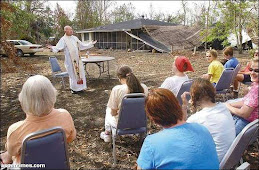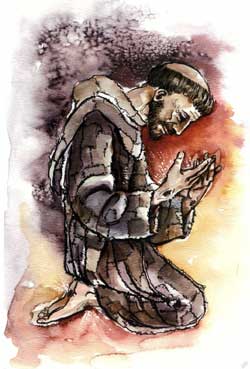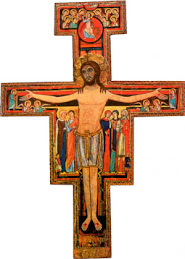I rejoiced when I heard them say: "Let us go to God's house." And now our feet are standing within your gates, O Jerusalem.
Jerusalem is built as a city strongly compact. It is there that the tribes go up, the tribes of the Lord.
For Israel's law it is, there to praise the Lord's name. There were set the thrones of judgment of the house of David.
For the peace of Jerusalem pray: "Peace be to your homes! May peace reign in your walls, in your palaces, peace!"
For love of my brethren and friends I say, "Peace upon you!" For the love of the house of the Lord, I will ask for your good.
* * * * * * *
1. We have just heard and enjoyed as a prayer one of the most beautiful and fervent songs of ascents. It is Psalm 122[121], a living, shared celebration of Jerusalem, the Holy City to which the pilgrims climb.
Indeed, in the opening line, two moments lived by the faithful are amalgamated: that of the day on which the pilgrim rejoiced when he accepted the invitation to "go to God's house" (v. 1), and that of his joyful arrival at the "gates" of Jerusalem (cf. v. 2); now at last he is walking on that beloved Holy Land. A festive hymn is on his lips at that very moment in honour of Zion, whose deep spiritual significance he contemplates.
2. As a "strongly compact" city (v. 3), a symbol of security and stability, Jerusalem is the heart of the unity of the 12 tribes of Israel that converge towards it as the centre of their faith and worship. They go up there, in fact, "to praise the Lord's name" (v. 4) in the place that "Israel's law" (Dt 12: 13-14; 16: 16) has chosen as the only legitimate and perfect shrine.
There is another important reality in Jerusalem that is also a sign of God's presence in Israel: "the thrones... of the House of David" (cf. v. 5); that is, the Davidic dynasty governs, an expression of the divine action in history that was to lead to the Messiah (II Sam 7: 8-16).
3. The "thrones... of the House of David" are at the same time called "thrones of judgment" (v. 5), because the king was also the supreme judge. Thus, Jerusalem, a political capital, was also the highest tribunal where controversies were settled in the final instance: in this way, when Jewish pilgrims left Zion, they returned to their villages feeling more righteous and peaceful.
The Psalm thus traced an ideal portrait of the Holy City with her religious and social function, showing that biblical religion is neither abstract nor intimistic, but a leaven of justice and solidarity. Communion with God is necessarily followed by the communion of brothers and sisters with one another.
4. We now come to the final invocation (cf. v. 6-9). It is marked throughout by the Jewish word shalom, "peace", traditionally considered to be the etymological root of Jerushalajim, the Holy City itself, interpreted as "city of peace".
It is well known that shalom alludes to the messianic peace that in itself brings joy, prosperity, goodness and abundance. Indeed, in the pilgrim's final farewell to the temple, to the "house of the Lord our God", he adds "good" to "peace": "I will ask for your good" (v. 9). This anticipates the Franciscan greeting: "Peace and good!". We all have something of a Franciscan soul. This greeting expresses the hope that blessings will be poured out upon the faithful who love the Holy City, upon the physical reality of its walls and buildings in which the life of a people pulsates, on all its brothers and sisters and friends. In this way, Jerusalem will become a hearth of harmony and peace. . . .
QUOTED FROM:
BENEDICT XVI
GENERAL AUDIENCE
Wednesday, 12 October 2005


















No comments:
Post a Comment